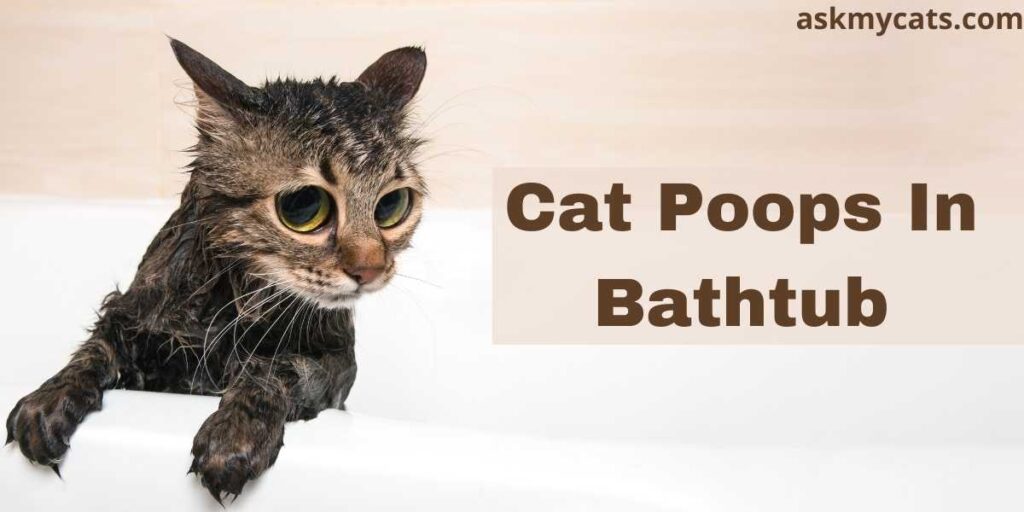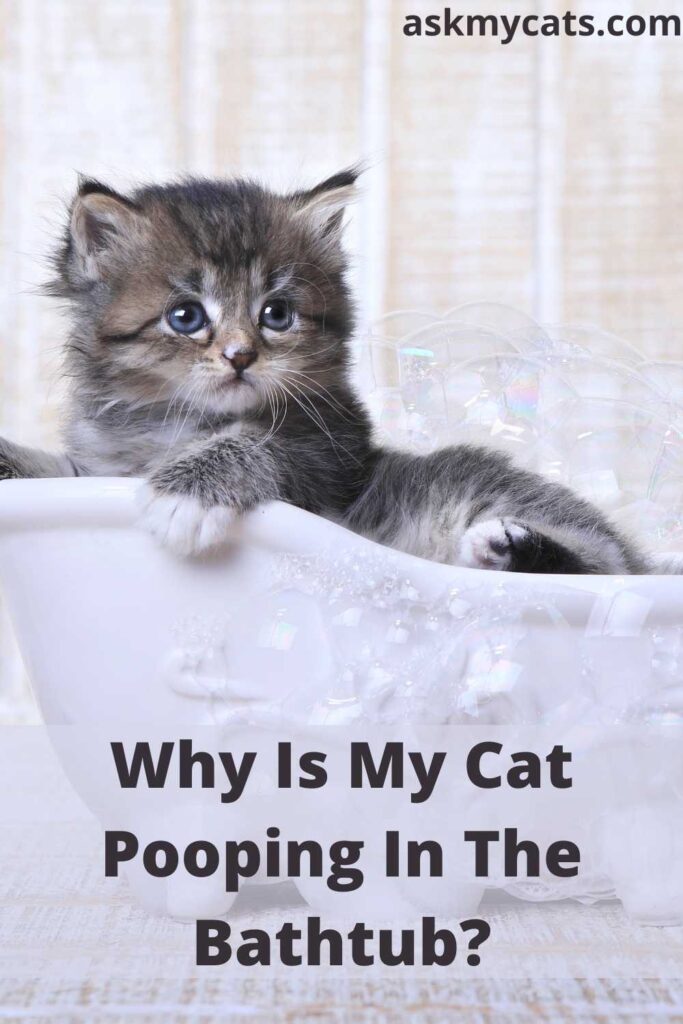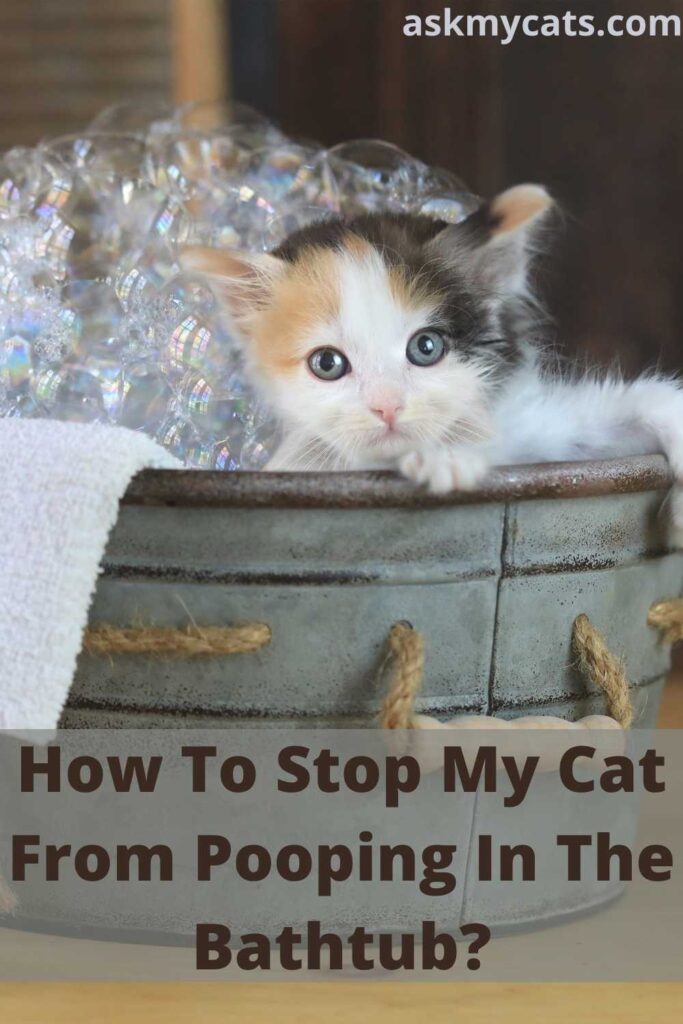If you own a cat, you know how aggravating it is when your cat poops or urinates anywhere other than its litter box — it’s dirty, stinky, and time-consuming to clean up!
The bathtub, which you want to keep as clean as possible, seems to be a favorite area for cats to choose from over their litterbox.
So, why does your cat poops in the bathtub?
There are a few easy explanations for why your cat might be pooping in the bathtub. This is pretty typical behavior in cats, and it is usually caused by minor behavioral issues, but it can also be a symptom of a more serious underlying condition.
Give this article a read to know more about why cats do so and how can you stop them from doing so.


Give Your Cat the Perfect Day
Get the Free Ebook!
Why Is My Cat Pooping In The Bathtub?
Here are the reasons behind your cat pooping in the bathtub: –

1. Behavioral Issues
The most prevalent cause of your cat pooping in the tub is behavioral concerns.
It could be because your cat has been stressed by recent household changes or because you haven’t properly trained your cat to use the litter box.
This is a common issue with kittens who are terrified of or have never been taught to use a litter box, as well as adopted adult cats who have never learned correct litterbox etiquette.
Changes in household dynamics are a common source of stress and anxiety in sensitive cats, and they may defecate outside the litter box as a result.
An addition to the family, such as a new baby, or the death of a family member, are examples of this.
Additionally, big changes in your daily routine, such as a new work schedule or an increase in the amount of time your cat is left alone, may cause stress in your cat. The addition of a new pet to the household can certainly result in house soiling.
This is both the most common and the most simple problem that causes cats to eliminate outside of their litterbox.
First, rule out any stressors that may have led your cat to quit using the box, such as a change in location or a loss of privacy, and double-check that their litterbox is in good working order.
Most cats use a litterbox instinctively, so making sure it’s clean and in a convenient, private position should encourage them to use it.
2. Health Issue
When a cat poops in the bathtub, it’s important to keep in mind that it could not be feeling well.
They may not have enough time to make it all the way to the litter box if the urge to defecate strikes quickly.
They could choose to relieve themselves in your tub if your bathroom is nearby.
Some cats purposely poop and pee in front of their owners or in a location they know will attract their attention in order to signal that they require assistance.
It’s also possible that the cat has formed a bad relationship with the litter box as a result of severe constipation. They’ll look for other places where they won’t have to deal with those awful recollections.
Your cat could have an underlying health problem, such as diarrhea, and won’t be able to use the litter box in time.
The behavior is usually transient under these instances, and it will end once your cat is well and happy again.
Constipation could also be the cause, which may sound counterintuitive. For your cat, constipation can be unpleasant at best and excruciating at worst, and they may associate the pain and discomfort with their litter box.
When cats eventually feel the urge to relieve themselves, they may prefer to do it in a private location such as the bathtub rather than in the litterbox.
If your cat’s poop is runny, it may be suffering from diarrhea. This could be due to a variety of factors, such as a change in diet or too many unhealthy foods, but it could also be due to an infection.
If their food remains the same and everything appears to be in order, you may need to take them to your veterinarian for a check-up.
If the litter box is in good working order and you can’t think of a behavioral reason why your cat is preferring to poop in the tub, you should consult your veterinarian.
Any other symptoms you see, such as a change in appetite, tiredness, diarrhea, constipation, or blood in your stool, should be noted.
Also, check out reasons and solution for cat peeing on bath mat
3. Stress
If something frightening or stressful happened near your cat’s litterbox, they may associate the tension and terror with the litterbox and opt to poop somewhere else.
Household changes, such as new pets or moving to a new home, can lead cats to get stressed, and this stress may cause them to stop using their litterbox.
Try relocating their litterbox to a peaceful, calm, and private area of the house where they won’t be disturbed.
If there have been any significant changes in your household that are causing your cat discomfort, keep them away from him.
If you’ve moved to a new home, for example, keep any new pets away from the litterbox and give your cat their own room for a few days.
Once your cat is no longer nervous, frightened, or scared, the behavior should go away.
Simple changes in a cat’s environment or routine might cause them stress, which can lead to behavioral changes.
It’s possible that bringing a new creature, person, or object into the house has irritated your cat.
It doesn’t have to be a major change to be stressful for them. Remember that their world is much smaller than ours; they are most likely reliant on one or two individuals (you and any other house members) and are only familiar with the world inside your home.
It’s possible that your cat is stressed because of tension in the house. You know your cat can read and feel our energy if you’ve ever been sobbing or fighting and suddenly your cat appears by your side.
Your cat can sense if you’re worried or if you’re arguing with someone in the house. They may be unhappy with the energy in the house and have opted to defecate in the bathtub in an attempt to alert you to a problem.
It’s rather straightforward to resolve their tension as long as it isn’t caused by a medical condition.
Start giving your cat more love and attention, no matter how much you already offer them. There’s no such thing as too much affection for a cat.
You can lessen their stress levels by simply establishing a calmer environment for them, talking to them more, speaking to them in a loving tone, spending more one-on-one time cuddling/petting/brushing them, or extending their playtime.
4. Litter Box Issue
It’s possible that your feline has been averse to using their litterbox as a result of an accident or a stressful occasion, causing them to use the bathtub instead!
Also, their box could be too small or difficult to access, or you could have acquired a new litterbox that they are terrified of – this is a regular problem with automatic litterboxes.
It’s a good idea to keep an extra litter box on hand in case your cat develops a dislike for one.
The general guideline is that you should have a litterbox for each cat you own, plus one more.
This way, if you decide to switch their litterbox to a different type or if anything has made them fearful of one litterbox, they’ll always have a choice other than the tub.
Cats are infamous for being picky about their food, bedding, and litter. If cats don’t like the litter in their litterbox, they may decide to go somewhere else to do their business.
If you’ve recently made any changes to their litter, such as purchasing scented litter or replacing brands, this could be the source of the problem.
There are many various kinds of cat litter on the market, and your cat might have a favorite.
Attempt to revert to the old litter, or take on the challenge of acclimating your cat to the new litter. If they’re similar, consider combining them and gradually fading out the old one.
Just because you haven’t made any changes doesn’t imply your cat is content with his or her litter box.
As cats become older, they get pickier, and just as one terrible experience might turn you off a favorite restaurant, one poor experience can throw your cat off their litter box.
A dirty litter box is a common cause of a cat pooping outside of its litter box. Some cats like to use a completely clean litter box every time they use it.
It’s a clean box for them to enter every time they go to the bathtub. It’s possible that they prefer it to their litter box because it’s cleaner.
You should start scooping the litter box every day if you haven’t already. To solve the problem, you might have to scoop twice a day.
It’s also crucial to change the litter on a regular basis. The frequency with which you must empty the litter box and replace it with new litter is determined by the type of litter you use.
Some pellet litters need to be changed once a week, whereas clay litters can go up to a month without needing to be changed.
When you’ve finished emptying the litter box, wash it well to get rid of any odors. If the litter box is really old or has been used by multiple cats before your current cat, it could be a good idea to get a new one that only has their fragrance on it (or one that doesn’t have as strong a scent).
Also, find out why is my cat peeing in the bathtub
How To Stop My Cat From Pooping In The Bathtub?
Once all medical causes have been eliminated, there are a few simple steps you can take to stop your cat from pooping in the bathtub. Try the technique that appears to be the most effective for your cat, lifestyle, and situation.

- The situation can be improved by making some basic adjustments to the litter box itself. Install a second litter box, preferably in a separate room, so your cat has a choice.
Clean out litter boxes once a week and empty them up to two or three times a day. To encourage litter box use, use a larger litter box.
The size of the litter box should be determined by the cat’s size rather than the space available. The box should be around 1 1/2 times your cat’s size.
Attempt a different brand of litter. Some cats are put off by the texture, odor, or other characteristics of certain varieties. - Make sure the litter box isn’t too close to the cat’s food and water sources. Some cats dislike covered or self-cleaning litter boxes. Cats can be scared by the lights, noise, and automatic motions, and an enclosed box can seem claustrophobic. These factors may be sufficient to make a cat avoid using its litter box.
- Using a modest amount of water, fill the sink and tub. This water may deter your cat from entering the tub or sink, therefore preventing the behavior.
If your cat’s behavior persists despite environmental modifications, a veterinary behaviorist who specializes in felines may be able to help.
This person may assist you in reinforcing acceptable behavior in your cat and may offer some ideas tailored to your cat and living situation.
Some behavioral disorders, particularly those related to anxiety, may be treated using behavior-modifying medicines. If the condition persists, talk to your veterinarian about this alternative. Never feed your pet any medication that is meant for human use.
How To Clean Cat Poop From Bathtub?
In order to clean cat poop from your bathtub use any bathroom cleaner, just make sure it is ammonia-free.
Wear rubber gloves and pick up the cat excrement with a plastic bag before dumping it in the garbage as soon as you discover it.
You should also disinfect the bathtub to remove bacteria and parasites found in your cat’s feces.
Use a disinfectant bathroom cleanser that does not contain ammonia. Cat pee includes ammonia, and the ammonia smell in cleaners signals to some cats that it’s a good spot to pee. You don’t want your cat to start peeing in the bathtub too.
Frequently Asked Questions
Can Cognitive Dysfunction make a cat poop in the bathtub?
Yes, your cat could be pooping in the bathtub as a result of cognitive issues. Older cats, in particular, may suffer cognitive difficulties similar to dementia in humans, resulting in confusion and pooping outside of the litterbox. They may even forget where their litterbox is or wait until the last minute to do their business, ending in feces in the bathtub! Anxiety, behavioral concerns, and physical issues associated with old age may all contribute to the behavior.
Should I react to my cat pooping in the bathtub?
No, you should not react to your cat pooping in the bathtub, because that is what they want. Your cat adores you and demands your attention, so if they don’t receive enough of it, they’ll act out in ways that draw your attention to them. They don’t care if the attention is positive or negative; all they want is it. They’ll pay attention if you call their name, pick them up, take them to the bathtub, and tell them they’re terrible cats if you find poop in the tub. They’ll employ that action to grab your attention when they make the connection between pooping in the bathtub and getting your attention.
How to know if the cat dislikes its litter?
Apart from checking to see if your cat poos in the litter box (rather than the bathtub), there are a few more telltale signals that your cat dislikes its litter. For example, your cat may prefer to stay near the litter box’s border in order to minimize contact with the litter. Your cat may also do its business as fast as possible, exiting the box without covering its poop. Your cat may react by sneezing near the litter if it is excessively dusty. In addition, if the litter is unpleasant, your cat may shake its paw aggressively as it exits the litter box. In the days after switching your cat’s litter brand, keep a lookout for any of these indicators.
Final Words
There are a variety of reasons why your cat may be pooping in the tub, the most of them are simple to resolve.
The most common cause is nervousness or aversion to their litter or litterbox – either something has scared them, or they simply don’t like the design of the litterbox or the variety of litter. This is an easy problem to solve.
If none of these remedies work, there may be a more serious problem, and you’ll need to take your cat to the vet for a check-up.
If you have any queries, ask us in the comments section.
